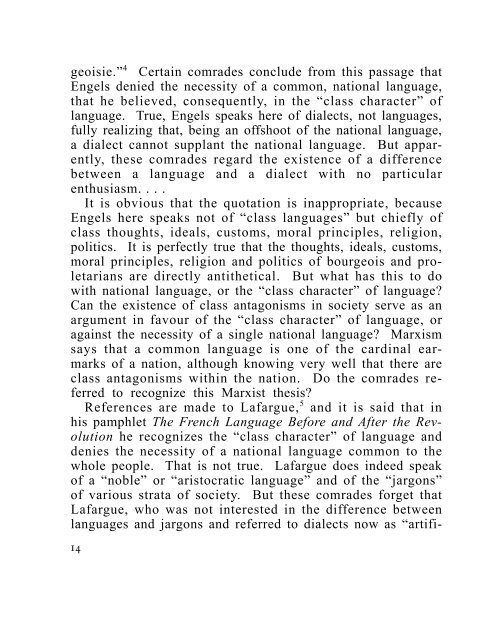Marxism and Problems of Linguistics - From Marx to Mao
Marxism and Problems of Linguistics - From Marx to Mao
Marxism and Problems of Linguistics - From Marx to Mao
- No tags were found...
Create successful ePaper yourself
Turn your PDF publications into a flip-book with our unique Google optimized e-Paper software.
geoisie.” 4 Certain comrades conclude from this passage thatEngels denied the necessity <strong>of</strong> a common, national language,that he believed, consequently, in the “class character” <strong>of</strong>language. True, Engels speaks here <strong>of</strong> dialects, not languages,fully realizing that, being an <strong>of</strong>fshoot <strong>of</strong> the national language,a dialect cannot supplant the national language. But apparently,these comrades regard the existence <strong>of</strong> a differencebetween a language <strong>and</strong> a dialect with no particularenthusiasm. . . .It is obvious that the quotation is inappropriate, becauseEngels here speaks not <strong>of</strong> “class languages” but chiefly <strong>of</strong>class thoughts, ideals, cus<strong>to</strong>ms, moral principles, religion,politics. It is perfectly true that the thoughts, ideals, cus<strong>to</strong>ms,moral principles, religion <strong>and</strong> politics <strong>of</strong> bourgeois <strong>and</strong> proletariansare directly antithetical. But what has this <strong>to</strong> dowith national language, or the “class character” <strong>of</strong> language?Can the existence <strong>of</strong> class antagonisms in society serve as anargument in favour <strong>of</strong> the “class character” <strong>of</strong> language, oragainst the necessity <strong>of</strong> a single national language? <strong><strong>Marx</strong>ism</strong>says that a common language is one <strong>of</strong> the cardinal earmarks<strong>of</strong> a nation, although knowing very well that there areclass antagonisms within the nation. Do the comrades referred<strong>to</strong> recognize this <strong>Marx</strong>ist thesis?References are made <strong>to</strong> Lafargue, 5 <strong>and</strong> it is said that inhis pamphlet The French Language Before <strong>and</strong> After the Revolutionhe recognizes the “class character” <strong>of</strong> language <strong>and</strong>denies the necessity <strong>of</strong> a national language common <strong>to</strong> thewhole people. That is not true. Lafargue does indeed speak<strong>of</strong> a “noble” or “aris<strong>to</strong>cratic language” <strong>and</strong> <strong>of</strong> the “jargons”<strong>of</strong> various strata <strong>of</strong> society. But these comrades forget thatLafargue, who was not interested in the difference betweenlanguages <strong>and</strong> jargons <strong>and</strong> referred <strong>to</strong> dialects now as “artifi-14
















